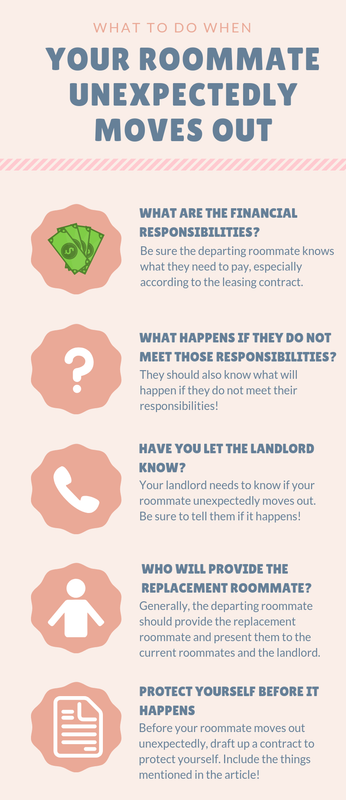What To Do When Your Roommate Unexpectedly Moves Out
Many college students have roommates to help them pay the rent and to provide some company. Roommate relationships usually work out well. But unfortunately, there are times where this relationship can be strained. One situation that can cause a major strain in the roommate relationship is if a roommate unexpectedly moves out. What should the remaining roommates do about the missing share of the rent? How should they tell the landlord? This is a frustrating situation, and it is definitely impolite to unexpectedly move out, but it still happens. In this article, you’ll find a few suggestions on what to do when your roommate unexpectedly moves out, and what to do if you want to move out.

How to protect yourself in case your roommate unexpectedly moves out
The best way to deal with this situation is to protect yourself financially and legally before it happens. Preferably, you should have signed an agreement or contract at the beginning of your lease. This contract should include a clause about what to do if a roommate unexpectedly moves out. But if you do not have this clause in your contract, it’s never too late to draft one up. This will make sure you are protected in case this happens. Your contract with your roommate and with the landlord should state a couple of things:
- How much advance notice a roommate should give to the landlord (and to the other roommates) before they move out.
- The financial responsibilities of the roommate who moves out: Do they have to pay their remaining share of the rent, or are they free of any financial responsibilities once they move out? (The latter is bad news for the remaining roommates, because they will then become responsible for the rest of the rent!)
- What will happen if they don’t meet their financial responsibilities? Are the remaining roommates and/or the landlord allowed to pursue legal action against the one who moved out?
- The roommate who moves out must provide a suitable replacement roommate. It is courteous for the roommate who moves out to provide their own replacement.
- The replacement roommate must be approved by the landlord and the remaining roommates.
- Do not try to sneak in a replacement roommate without letting the landlord know! In fact, this is grounds for eviction because it can be considered an unauthorized sublet. It is better to keep the landlord in the loop of what is going on.
- Make it clear that once the roommate moves out, they no longer have the right to live in that place.
- Some people come back to their old place thinking they still have a right to live there! Make it clear that the roommate has no rights to the place anymore, and that they must give up all their keys to the place.
Again, the best way to avoid this situation is to legally protect yourself from it. If you have a contract that spells out the procedures and financial responsibilities of a roommate unexpectedly moving out, it will soften the blow of this frustrating situation.
Another way to protect yourself is for you and your roommate(s) to be good tenants. A roommate moving out unexpectedly is technically a violation of the leasing contract, since they are breaking it early. This can be grounds for a landlord to evict everyone living in the place, and there is a chance they will take advantage of that opportunity if you are bad tenants. However, if you are good tenants, the landlord will likely not want to evict everyone. Being a good tenant means to pay the rent consistently on time, not sublet the place without the landlord’s permission, take good care of the place, and to be respectful of the neighbors. If you are a good tenant, your landlord will be more likely to help you if you ever get stuck in a sticky situation (like your roommate moving out unexpectedly).

What to do if it’s too late and your roommate has already unexpectedly moved out:
The previous tips were good ideas on how to protect yourself before this happens, but what if it’s too late? Let’s discuss what to do if your roommate has already moved out.
Read the leasing contact
Read the leasing contract and figure out what it says to do if a roommate unexpectedly moves out. If there is nothing written about that in the contract, you are out of luck. But if your contract does address this issue, follow what the contract says.
Try to contact your former roommate and make plans to move forward
- Remind your former roommate of what the leasing contract says to do if they move out. For example, if the contract states that they are responsible for the rest of their share of the rent, or that they are responsible for finding a suitable replacement roommate, let them know.
- Ask them how they plan to meet their financial responsibilities of the lease. Are they going to pay the rest of their share of the rent? If so, when do they plan to pay it? Or will you be responsible for their share now that they’re gone?
- Ask them if they plan to find a replacement roommate, and when. Generally, it should be the responsibility of the departing roommate to find their replacement and introduce him/her to the roommates and the landlord. It’s also important they find the replacement quickly, so that their room won’t be vacant for too long. This should be outlined clearly in the rental contract. But if your former roommate does not plan to find a replacement, it will be up to you.
Try to come to a deal about all these things with your former roommate, and definitely consider what your leasing contract says. Once you have contacted your roommate, you can contact your landlord. (If you can’t contact your former roommate, go directly to your landlord and explain the situation.)
Notify your landlord right away
It’s best to be upfront and honest with your landlord about these things, so after you have contacted your former roommate and have made plans to move forward, please call your landlord and notify them of what has happened. Also, let your landlord know how you and your roommate are planning to move forward. Be sure to keep your landlord in the loop about these things.
Look for a replacement roommate
If your former roommate leaves you with the responsibility of choosing their replacement, start looking as soon as possible. Before you start looking, though, think about what you want in a roommate. This will help you narrow down the list of people you can ask. For example, if you are allergic to cats or dogs, you will want a roommate who does not have a cat or a dog, and this will narrow down the list of potential roommates.
You can look for a roommate in person, but you can also use the Internet to find a roommate. Websites like Roomsurf will connect you potential roommates. Take advantage of these tools! The sooner you find a replacement roommate, the sooner you will not be responsible for the rest of the rent.
Be accommodating to your landlord
Yes, having a roommate move out is frustrating for you. But it is also frustrating to your landlord, too, so please try to be accommodating to them. Keep the place clean, help the landlord find someone to replace your former roommate. This is important, as keeping your place clean will allow your landlord to show it to potential tenants. (They can’t show off the place to potential tenants if it is trashed!) If you are accommodating your landlord, they will likely be accommodating to you, too.
If you must, talk to a lawyer
Sometimes, even if there a previous contract, people just don’t want to do their share. If you cannot get your former roommate to cooperate, consider pursuing legal action in a small court. I am not a lawyer, so I can’t give you any further advice on this. However, I can tell you to consider this CAREFULLY, because sometimes pursuing legal action is more of a hassle than it’s worth. You might be better off paying your former roommate’s share of the rent than paying legal fees. But on the other hand, this might work for you, especially if you have a contract and proof that your former roommate violated it. If your former roommate is not pulling their weight, carefully consider talking to a lawyer.
If your roommate moves out unexpectedly, you can still do these things to help ease the situation as soon as possible.

If you are the roommate who wants to move out…
Life happens, and you might be the roommate who needs to move out unexpectedly. Let’s discuss some tips to make the transition smooth for you, your former roommates, and your landlord.
Let your landlord and other roommates know your intentions as soon as possible
If you want to move out, please do not do so unexpectedly. Give your roommates and your landlord plenty of notice. Your rental contract might state how much notice you need to give before you leave; follow those guidelines! This will help them arrange for a smooth transition (and if you don’t plan to find your own replacement, this will give them time to find your replacement). In other words, communicating with your landlord and your roommates will make the situation easier on everyone.
Abide by the financial responsibilities outlined in your lease agreement
Your lease contract likely outlines your financial responsibilities if you break the lease early. Read about these responsibilities and abide by them. If you need to pay the rest of your rent up front, do it. If you cannot meet these financial responsibilities, try talking to your landlord and setting up another payment deal. It’s better to be honest with your landlord about these things. Be sure to pay what you owe, according to the contract.
Provide a suitable replacement for yourself, and introduce them to the landlord and roommates
When a roommate breaks the lease early, it is generally the responsibility of the departing roommate to find their replacement. Please don’t make the remaining roommates find your replacement. Instead, you should make the effort to find someone suitable. Find someone who can pay the rent on time, will get along with the other roommates, and will not trash the place. Once you find someone, introduce them to the remaining roommates and to the landlord. Let the landlord know this person will be taking your place. If you do not let the landlord know about your replacement, it could be considered an unauthorized sublet, which is prohibited by most rental contracts. Don’t let yourself get into any more trouble… just let your landlord know who is replacing you!
If you must break your lease early, please be kind about it. It will likely be frustrating to your roommates and your landlord, so try to be accommodating to them and make the transition as smooth as possible.
Yes, it is frustrating to have a roommate move out unexpectedly. If you have a roommate, be sure to protect yourself legally and financially with a contract. Your contract should outline what happens if someone moves out unexpectedly (the financial responsibilities and who finds the replacement). This is the best way to soften the blow if it does happen. However, if your roommate has already unexpectedly moved out, it will be too late to do this. Try to contact them and decide how to move forward according to the rental contract. Then, contact your landlord and let them know what happens. If you can’t get ahold of your roommate and they have already left, contact your landlord directly. If you can, you can even seek legal advice about this situation (but proceed with caution if you decide to take this route- it’s expensive). In other words, having a roommate move out is frustrating, but it is not the end of the world. There are steps you can take to protect yourself and to get your life back to normal as soon as possible.

Interested in using our roommate matching formula to find the perfect college roommate for you? Create a profile & take the roommate quiz on Roomsurf! Get Started
